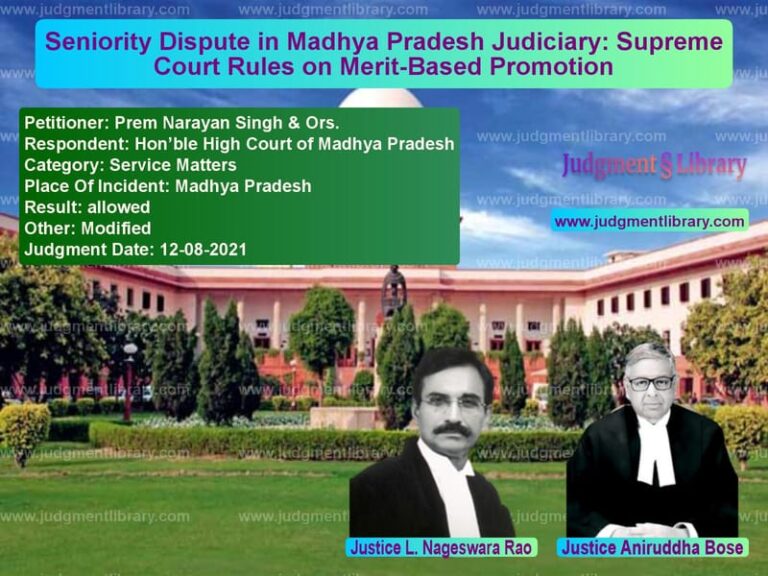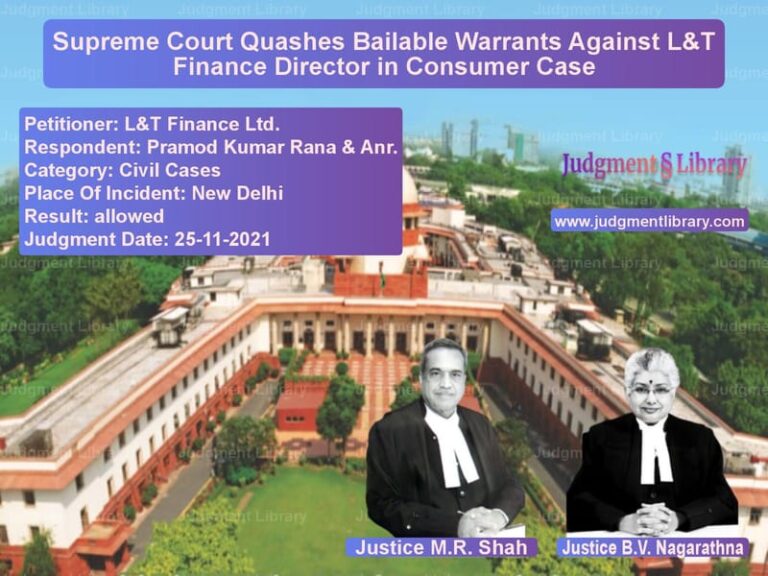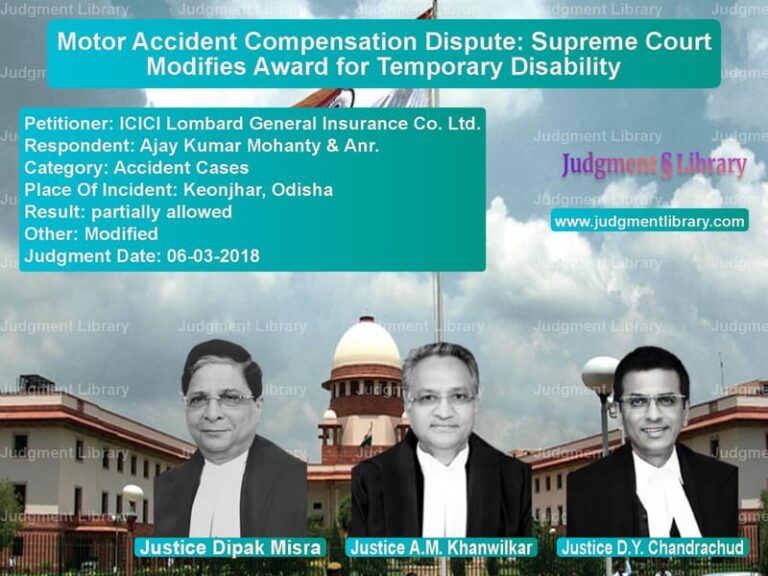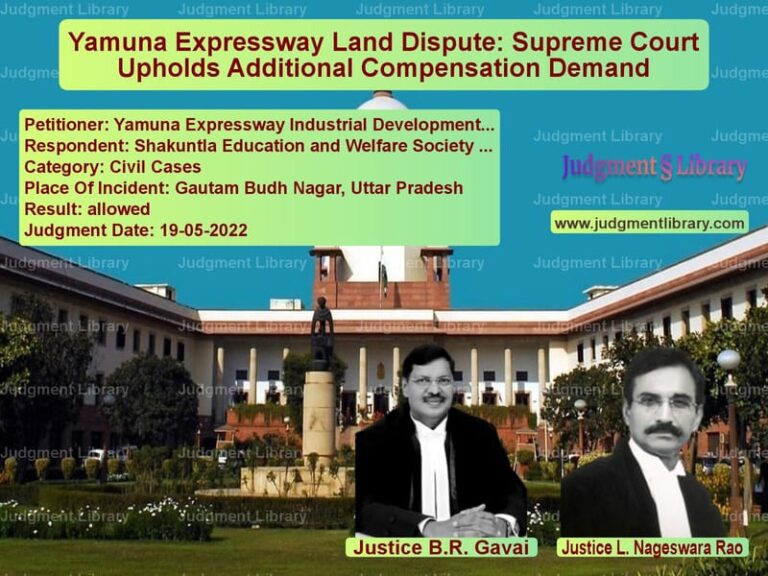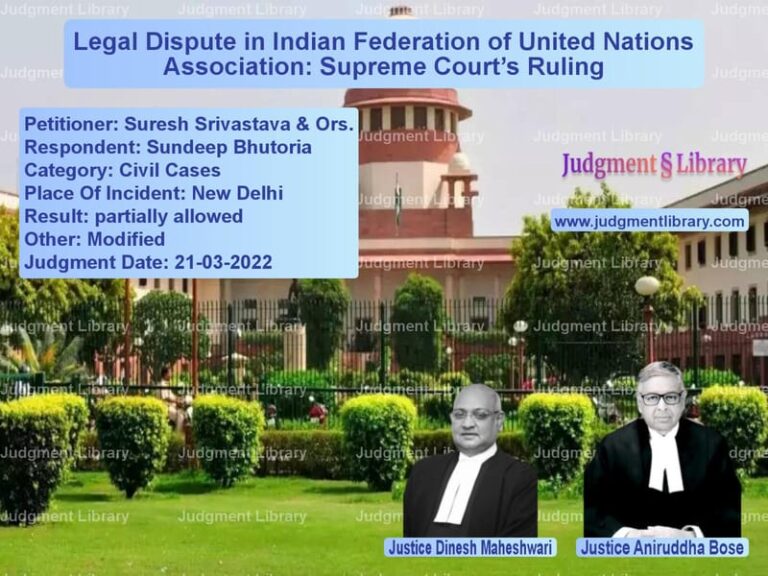Supreme Court Remands Caste Certificate Case for Fresh Review
The Supreme Court, in the case of Rushikesh Bharat Garud vs. The State of Maharashtra & Ors., addressed the issue of caste certificate validation under the jurisdiction of the Scheduled Tribe Certificate Scrutiny Committee, Nashik. The Court set aside the Bombay High Court’s judgment and remanded the matter for a fresh review along with related cases of the appellant’s family members. This ruling underscores the importance of a consistent approach in caste certificate scrutiny to avoid conflicting decisions.
Background of the Case
The appellant, Rushikesh Bharat Garud, had his caste certificate invalidated by the Scheduled Tribe Certificate Scrutiny Committee, Nashik. Aggrieved by this decision, he challenged the order before the Bombay High Court in Writ Petition No. 11536 of 2021. However, the High Court dismissed his petition, prompting an appeal before the Supreme Court.
The appellant relied on the validity certificates issued earlier to his father and cousins, including:
- Bharat Nagu Garud (father) – 14.01.2005
- Nilima Rohidas Garud – 9.9.2005
- Pravin Rohidas Garud – 9.9.2005
- Priyanka Rohidas Garud – 20.09.2005
- Rohidas Nago Garud – 25.05.2011
- Ramdas Nagu Garud – 07.12.2012
The appellant argued that since these relatives had been granted valid caste certificates, his certificate should also be considered valid.
Key Legal Issues
- Whether the Scrutiny Committee erred in invalidating the appellant’s caste certificate despite previous validity certificates issued to his family members.
- Whether the High Court was justified in dismissing the writ petition without directing a fresh review.
- Should all related caste certificate cases be considered together to ensure consistency in decisions?
Arguments Before the Supreme Court
Arguments by the Appellant
The appellant, represented by Advocate Uday B. Dube, contended that:
- His father and cousins had already been issued valid caste certificates, which should serve as a precedent for his own claim.
- The Scrutiny Committee had failed to consider relevant records while rejecting his caste certificate.
- The previous certificates had not been canceled at the time of his application, making their validity a strong factor in his favor.
- Since the Scrutiny Committee had issued a show-cause notice to his father and cousins questioning their caste certificates, all cases should be reviewed together to avoid inconsistencies.
Arguments by the State of Maharashtra
The State, represented by Advocate Sachin Patil, argued that:
- The Scrutiny Committee was justified in its decision as it found discrepancies in the caste claims.
- While previous certificates existed, they were not supported by consistent documentary evidence.
- The High Court had correctly upheld the Scrutiny Committee’s findings.
Supreme Court’s Judgment
Fresh Review of Caste Certificate
The Supreme Court ruled that since the validity of the caste certificates issued to the appellant’s father and cousins was under review, it would be appropriate to consider all cases together to avoid inconsistent rulings. The Court stated:
“It will be appropriate if the cases of all, namely, the father of the appellant, cousins of the appellant, and the appellant herein be considered together, to avoid any conflicting orders.”
Setting Aside the High Court’s Order
The Supreme Court held that the High Court had not properly considered the implications of the pending review of the caste certificates of the appellant’s family members. Therefore, it set aside the High Court’s judgment and directed the Scrutiny Committee to undertake a fresh review.
Clear Timeline for Review
The Court instructed the Scrutiny Committee to complete its review and issue a fresh order within three months. The Court emphasized:
“The Scrutiny Committee to pass fresh order/s in accordance with law and on its own merits and on the basis of the material available on record and/or that may be produced and pass a speaking order at the earliest, preferably within a period of three months from today.”
No Determination on Merits
The Supreme Court clarified that its ruling did not determine the validity of the appellant’s caste certificate but merely ensured a fair and uniform review. The Court stated:
“At the cost of repetition, it is observed that this Court has not gone into the merits of the case at all and has not observed anything on the validity of the caste certificate issued in favor of the appellant.”
Key Takeaways from the Judgment
- Consistency in Caste Certificate Decisions: The ruling highlights the need for uniformity in caste certificate validation, ensuring that members of the same family are treated equally.
- Judicial Oversight in Scrutiny Committee Decisions: The Court reaffirmed that Scrutiny Committees must follow fair procedures and consider all relevant documents before invalidating caste certificates.
- Fair Opportunity for Review: The decision ensures that individuals whose caste certificates are challenged receive a proper hearing.
- Timely Resolution: The three-month timeline emphasizes the need for quick and fair adjudication in caste certificate disputes.
- Judicial Restraint: The Court refrained from making any conclusive determination, respecting the role of the Scrutiny Committee in deciding caste certificate validity.
Final Verdict
The Supreme Court allowed the appeal and remanded the matter to the Scrutiny Committee for fresh consideration along with the pending cases of the appellant’s father and cousins. This ensures a just and consistent approach in deciding caste validation disputes.
Conclusion
This ruling sets a crucial precedent for caste certificate validation, reinforcing procedural fairness and consistency in administrative decisions. It highlights the role of courts in ensuring that caste scrutiny mechanisms operate transparently and without arbitrariness.
Petitioner Name: Rushikesh Bharat Garud.Respondent Name: The State of Maharashtra & Ors..Judgment By: Justice M. R. Shah, Justice B. V. Nagarathna.Place Of Incident: Maharashtra.Judgment Date: 10-12-2021.
Don’t miss out on the full details! Download the complete judgment in PDF format below and gain valuable insights instantly!
Download Judgment: rushikesh-bharat-gar-vs-the-state-of-maharas-supreme-court-of-india-judgment-dated-10-12-2021.pdf
Directly Download Judgment: Directly download this Judgment
See all petitions in Fundamental Rights
See all petitions in Public Interest Litigation
See all petitions in Judgment by Mukeshkumar Rasikbhai Shah
See all petitions in Judgment by B.V. Nagarathna
See all petitions in allowed
See all petitions in Remanded
See all petitions in supreme court of India judgments December 2021
See all petitions in 2021 judgments
See all posts in Constitutional Cases Category
See all allowed petitions in Constitutional Cases Category
See all Dismissed petitions in Constitutional Cases Category
See all partially allowed petitions in Constitutional Cases Category


